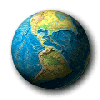Globe

Working in a Democracy
There are only two sources of wealth. One is the natural resources of the earth, the other is the knowledge and physical ability of the human species to make use of these resources. An unfortunate aspect of our modern economy is that when raw materials and human abilities come together, it is not the product that has most value, it is its worth in money that is sought after. It is not the product's usefulness, rarity or beauty that is important, but the power that is brought by the money it can create by getting people to buy it.
The farmer is a good illustration. He takes one natural resource, a seed, and puts it in another natural resource, the earth. He uses his knowledge and skills to create wealth in the form of food, the most important form of wealth that exists. However, that is not to most people the real or recognized form of wealth. That wealth is the money generated mostly by the peripheral participants in the food making process. These are the lenders of money, the investors of money, the exchangers of money, the manipulators of money. The farmer himself, the original creator of this wealth gains the least for his effort.
Two things keep our economy going: the 'need' we, as consumers, have to buy things we feel are useful, and the 'need' for us to produce goods that do not remain useful for very long so that they have to be replaced. When we stop buying things we have to stop making them. Then we lose our jobs and can't afford to buy those 'needs'. No matter where we enter this vicious circle, the effect is the same - economic crisis.
We have lost sight of what money is for. It has no intrinsic value. Originally it did have. The value of goods was transferred to gold or silver, which was then realized in terms of something else of value. Money itself has only power value. It was invented to ease the transfer of goods between people, and allowed for specialization of effort and thus more efficient production. When the pseudo wealth of control is created through the manipulation of money without any direct connection to the two sources of wealth, that wealth has no real substance. When confidence is lost, chaos results. When we lose confidence in the currency of a country, its value can vanish overnight.
The idea of amassing capital in one place to finance a business activity that will create worthwhile goods that we want to consume or use, is a good one. However, the buying and selling of money in the process we use today has a serious fault. The aim is usually to transfer money, euphemistically called 'shares', from the pool of investment into one's own coffers or financial control, at the expense of someone else not so adept at working the system.
Our economy is running into a brick wall. The wall is the trend to cutting out the natural resource of human skill in the creation of wealth from the raw materials of the earth. People are losing their jobs because of technological advances funded by an oversupply of money divorced from real wealth. Unemployment prevents people from being able to buy goods they would like. When the shaky buffer of Employment Insurance income dries up, people are unable to buy the things they really need. Poverty sets in and spreads like a cancer in society, bringing its attendant ills of anger, despair, violence, sickness, and all the other miseries that the human condition is prone to.
Where is Democracy in the Working World? What has happened to the ideal of the Right to Work? It is the forgotten "Freedom". If we transpose the words "the right to work" for "Freedom" in Barbour's poem, we see a truth that rings out like a clarion call, clear and pure through six hundred years.
The spiritual nature of work cannot be overlooked. The Christian Bible says, in a specific context, that the labourer is worthy of his hire, but this can be broadened to encompass all 'labourers', whether as the missionary farmer of Luke, or the computer analyst of our high tech world.
Many religions recognize the value of work in the development of the person. If we believe there is a bit of God the Creator in each one of us, it could be suggested that it is the creative spirit or urge in us to make something, to be creative, that separates us from the rest of the animal world. Why does our society not put a significantly higher value on our work?
To avoid the economic brick wall we are running headlong into with our non labour-intensive technologies, we must re-think our attitude to work, and bring it into line with the new reality. We have to establish that people not only have the right to work, they have the need to work.
The amount of time spent working has lessened from 6 1/2 days a week a hundred years ago to 5 days. However this is not a true picture of reality. There is a growing tendency for some employers to hire people as permanent part-time workers to avoid paying benefits. Some employers have periods of heavy workloads followed by quiet periods, and deal with the problem by having their employees work overtime.
Too heavy a demand on the employee is just as bad as too little. We must have a work week that evens out the load for everyone.